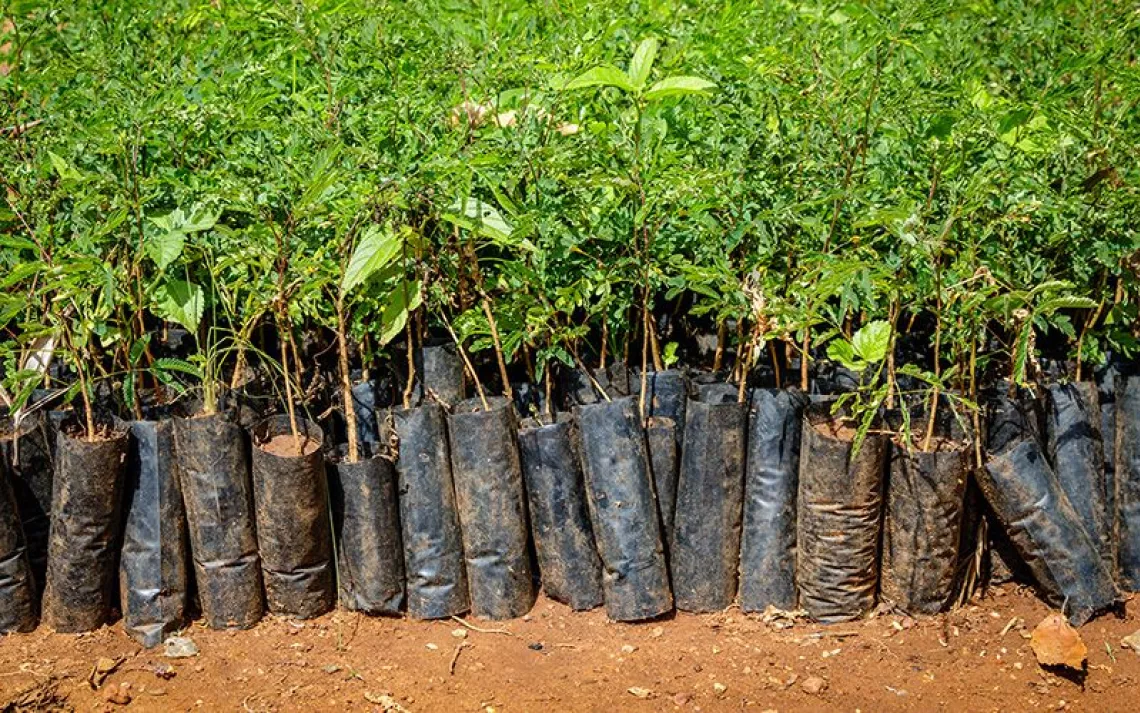| CRITERIA | POINTS | SCORING BASIS |
| Peer-to-peer sustainability educator program | 7 | Institutions earn all available points by having a peer-to-peer educator program that reaches degree-seeking students. |
| Student sustainability outreach campaign | 7 | Institutions earn 3/4 of available points for having at least one sustainability-related outreach campaign directed at students. Institutions earn 1/4 of available points for verifying that program with a website link. |
| Sustainability during orientation for new students | 7 | Institutions earn all available points for including sustainability prominently during new-student orientation events. |
| Sustainability outreach and publications | 7 | Institutions earn 1/10 of available points for each website, newsletter, or other literature that fosters sustainability awareness. |
| Sustainability student group | 7 | Institutions earn all available points for having at least one student group focused on sustainability. |
| Organic garden | 7 | Institutions earn all available points for having an on-campus organic garden where students can gain gardening or farming experience. |
| Sustainability events | 7 | Institutions earn all available points for hosting major events (conferences, symposia, etc.) related to sustainability. |
| Outdoor program | 7 | Institutions earn all available points for having a program that organizes outings for students and teaches "leave no trace" principles. |
| Sustainability-themed semester or year | 7 | Institutions earn all available points for having chosen a sustainability-related theme for its themed semester, year, or first-year experience over the past three years. |
| Sustainability course curriculum and identification | 7 | Institutions earn 1/2 available points for each of two items: having identified sustainability-related and sustainability-focused courses; and having made an inventory of those courses available online. |
| Sustainability-focused courses | 7 | Institutions earn all available points when sustainability-focused courses make up 20% or more of all courses offered. Incremental points are available. |
| Sustainability-related courses | 7 | Institutions earn all available points when sustainability-related courses make up 20% or more of all courses offered. Incremental points are available. |
| Sustainability learning outcomes | 10 | Institutions earn all available points when 20% of students graduate from programs that have adopted at least one sustainability learning outcome. Incremental points are available. |
| Undergraduate program in sustainability | 7 | Institutions earn all available points for offering at least one sustainability-focused undergraduate major, degree program, or equivalent. |
| Sustainability immersive experience | 7 | Institutions earn all available points for offering at least one sustainability-focused immersive program. |
| Sustainability literacy assessment | 10 | Institutions earn 1/4 of available points for conducting sustainability-literacy assessments on students and 3/4 of available points for conducting follow-ups thereof on the same group of students. |
| Sustainability research inventory availability | 7 | Institutions earn all available points for making sustainability research inventory publicly available online. |
| Faculty engaged in sustainability research | 7 | Institutions earn half of available points by calculating the percentage of faculty engaged in sustainability research. Institutions earn up to the remaining half as a proportion of the highest percentage reported. |
| Departments engaged in sustainability research | 7 | Institutions earn half of available points by calculating the percentage of departments engaged in sustainability research. Institutions earn up to the remaining half as a proportion of the highest percentage reported. |
| Sustainability research incentives | 7 | Institutions earn 3/4 of available points for encouraging faculty research. Institutions earn 1/4 of available points by encouraging student research. |
| Percentage of existing building space certified as sustainable | 10 | Institutions earn a percentage of total available points equivalent to the percentage of existing building space on campus considered sustainable. |
| Percentage of new building space certified as sustainable | 10 | Institutions earn points as a percentage of total available points equivalent to the percentage of new building space on campus considered sustainable. |
| Scope 1 and 2 emissions inventory | 30 | Institutions earn all available points for calculating Scope 1 and 2 greenhouse gas emissions as verified either from ACUPCC or another third party site, from an internally kept site, or from data entered into the STARS collector. |
| Scope 3 emissions inventory | 35 | Institutions earn 1/7 of available points for each type of Scope 3 calculation conducted among types outlined in the STARS collector. |
| Scope 1 and 2 emissions inventory in performance year | 10 | Institutions earn all available points for calculating Scope 1 and 2 gross greenhouse gas emissions during the performance year. |
| Local offsets program | 30 | Institutions earn all available points for having a program that reduces greenhouse gas emissions in the local community. |
| Food and beverage purchasing policies | 30 | Institutions earn 1/3 of available points by calculating the percentage of food expenditures that either are grown and processed within 250 miles of the institution or are third-party-certified responsible (certified organic, fair trade, etc). Institutions earn up to 2/3 of available points as a proportion of the highest percentage reported. |
| Vegan options | 7 | Institutions earn all available points for offering complete-protein vegan dining options during every meal. |
| Pre-consumer food waste composting | 7 | Institutions earn all available points for having a pre-consumer food waste composting program. |
| Post-consumer food waste composting | 7 | Institutions earn all available points for having a post-consumer food waste composting program. |
| Energy consumption in buildings | 40 | Institutions earn 1/3 of available points by calculating total building energy consumption. Institutions earn a percentage of remaining points as a percentage of the top-reducing institution's reduction. |
| Renewable energy sources | 45 | Institutions earn 1/3 of available points by calculating all energy from renewable sources, purchasing renewable energy credits or green power from the electric utility, and/or generating electricity using co-generation technologies. Institutions earn a percentage of the remaining points based on the amount of their total energy consumption that is clean or renewable. |
| Lighting sensors | 7 | Institutions earn all available points for using light sensors to reduce energy use in at least one building. |
| LED lighting | 7 | Institutions earn all available points for using LED lighting in at least one lighting application. |
| Tree Campus USA | 7 | Institutions earn all available points for being recognized by the Arbor Day Foundation's Tree Campus USA program. |
| EPEAT | 7 | Institutions earn a percentage of available points based on the percentage of computers purchased that are registered EPEAT Silver or Gold. |
| Sustainable cleaning products | 10 | Institutions earn 1/3 of available points by having an institution-wide stated preference for Green Seal or EcoLogo purchasing, and 1/3 for calculating the percentage of total expendures spent on green-certified cleaning products. Institutions earn a percentage of the remaining 1/3 of available points based on the percentage of cleaning products purchased that are green. |
| Responsible paper purchasing | 15 | Institutions earn 1/10 available points for having a stated policy for responsible paper purchasing. The remainder of available points are awarded based on a sliding scale, depending on the percentage of recycled content: Higher weightings are awarded to purchases of 90% to 100% postconsumer recycled content office paper. |
| Vendor code of conduct | 7 | Institutions earn all available points by having and following a vendor code of conduct. |
| Campus fleet | 20 | Institutions receive credit based on the proportion of their fleet that uses alternative power/fuel, weighted by the type of alternative fuel used. |
| Student commute | 20 | Institutions earn points based on the percentage of students who use more sustainable commuting options. |
| Employee commute | 20 | Institutions earn points based on the percentage of employees who use more sustainable commuting options. |
| Bicycle-sharing program | 7 | Institutions earn all available points by having a bicycle-sharing program. |
| Facilities for bicyclists | 7 | Institutions earn all available points by having bike storage, shower facilities, and lockers for bicycle commuters. |
| Mass-transit programs | 7 | Institutions earn all available points by offering reduced transit passes or a free campus shuttle. |
| Condensed workweek | 7 | Institutions earn all available points by offering a condensed workweek option to some employees. |
| Telecommuting | 7 | Institutions earn all available points by offering a telecommuting program to employees. |
| Carpool/vanpool matching | 7 | Institutions earn all available points by offering a carpool or vanpool matching program. |
| Local housing | 7 | Institutions earn all available points by offering employees incentives to live near campus. |
| Car sharing | 7 | Institutions earn all available points by participating in car-sharing programs. |
| Waste reduction | 25 | Institutions earn all available points by having reduced waste generation by 16% or more, compared to a 2005 baseline. Incremental points are available based on the percentage reduction achieved. |
| General waste diversion | 20 | Institutions earn half of available points by calculating general waste diversion. Institutions earn a percentage of remaining available points based on the percentage of diversion achieved. |
| Waste diversion during new construction and demolition | 20 | Institutions earn half of available points by calculating waste diversion during new construction and demolition. Institutions earn half of available points based on the percentage of diversion achieved. |
| Electronic-waste recycling program | 20 | Institutions earn half of available points by having a program to refurbish, reuse, or recycle electronic waste generated by the school. Institutions earn half of available points for having a similar program for electronic waste generated by students. |
| Move-in waste reduction | 20 | Institutions earn all available points for having a program to reduce move-in waste. |
| Water consumption | 40 | Institutions earn half of available points by showing a reduction in total water consumption between 2005 and the performance year. Institutions earn a percentage of the other half based on the percentage of water reduction as compared to the top-reducing school. |
| Stormwater management | 40 | Institutions earn 1/4 of available points for having a development policy, 1/4 for having an operations policy, and 1/8 for each for up to four other policies or strategies. |
| Nonpotable water usage | 15 | Institutions earn 1/2 of available points for using nonpotable water and a percentage of remaining points based on the extent of nonpotable water usage. |
| Sustainability coordination | 20 | Institutions earn 1/3 of available points each for having a sustainability committee, office, or officer. |
| Strategic plan | 25 | Institutions earn all available points by having an overall strategic plan that includes high-level sustainability. |
| Sustainability plan with input | 25 | Institutions earn all available points by having a sustainability plan that includes input from faculty, staff, and students. |
| Committee on investment responsibility | 15 | Institutions earn all available points by having a committee on the social and environmental responsibility of financial investments. |
| Positive sustainability investments | 20 | Institutions earn all available points by having made socially or environmentally responsible financial investments. |
| Sustainable investment policy | 20 | Institutions earn all available points for having and stating a policy or directive to consider the social and/or environmental impacts of financial investment decisions. |
| Investment disclosure | 20 | Institutions earn all available points by making a snapshot of financial investments accessible to the public. |
| Intercampus collaboration on sustainability | 7 | Institutions earn all available points by collaborating with other colleges and universities to build the sustainability community. |
| Innovations | 40 | Institutions earn 1/4 of available points for each sustainability innovation listed. |
| Energy use by type | 25 | Institutions earn 4/5 of available points by calculating the percentage of electricity from alternative or renewable sources. Institutions earn the remaining 1/5 points by calculating their percentage of heating from alternative or renewable sources. |
 The Magazine of The Sierra Club
The Magazine of The Sierra Club







